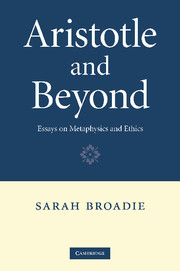Book contents
- Frontmatter
- Contents
- Preface
- Acknowledgments
- Chapter 1 Affecting and being affected
- Chapter 2 Backwards causation and continuing
- Chapter 3 From necessity to fate: An inevitable step?
- Chapter 4 Alternative world-histories
- Chapter 5 A contemporary look at Aristotle's changing Now
- Chapter 6 Nature and craft in Aristotelian teleology
- Chapter 7 Soul and body in Plato and Descartes
- Chapter 8 Aristotle and contemporary ethics
- Chapter 9 On the idea of the summum bonum
- Chapter 10 What should we mean by ‘the highest good’?
- Chapter 11 The good of practical beings: Aristotelian perspectives
- Chapter 12 Taking stock of leisure
- References
- Index of names
Chapter 2 - Backwards causation and continuing
Published online by Cambridge University Press: 25 June 2009
- Frontmatter
- Contents
- Preface
- Acknowledgments
- Chapter 1 Affecting and being affected
- Chapter 2 Backwards causation and continuing
- Chapter 3 From necessity to fate: An inevitable step?
- Chapter 4 Alternative world-histories
- Chapter 5 A contemporary look at Aristotle's changing Now
- Chapter 6 Nature and craft in Aristotelian teleology
- Chapter 7 Soul and body in Plato and Descartes
- Chapter 8 Aristotle and contemporary ethics
- Chapter 9 On the idea of the summum bonum
- Chapter 10 What should we mean by ‘the highest good’?
- Chapter 11 The good of practical beings: Aristotelian perspectives
- Chapter 12 Taking stock of leisure
- References
- Index of names
Summary
Although much attention has been given in recent years to the topic of backwards causation, little if any has been paid to the concept of temporal continuing, which I hope to show is not only relevant to that topic but decisive for its concludings. Michael Dummett, indeed, in his fascinating 1954 paper showed himself aware that ‘backwards causation’ must square itself with temporal continuing. But little more seems to have been added since then. In this paper I shall argue that the temporal direction of causation is determined by the temporal direction of the continuing of events, and that as long as this is not clear, the argument for backwards causation looks sounder than it otherwise would. If my argument holds, it will follow that should there be no such concept as ‘backwards continuing’, neither will there be such a concept as ‘backwards causation’.
The argument requires us to examine the relation between the temporal direction of continuing and the temporal direction of causation. I shall begin by comparing backwards causation with forwards causation in order to find whether there is something absent in the former and present in the latter that we can identify as what makes forwards causation the viable concept it appears to be and whose absence in backwards causation correspondingly denudes it of meaning. I shall argue that even forwards causation would not make sense as causation at all if the events it relates were not taken as continuing in time; and that it is just this that is missing from backwards causation as philosophers have generally represented it.
- Type
- Chapter
- Information
- Aristotle and BeyondEssays on Metaphysics and Ethics, pp. 18 - 32Publisher: Cambridge University PressPrint publication year: 2007



